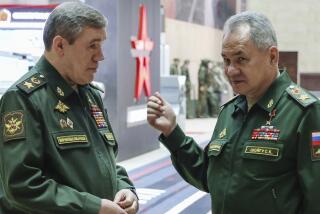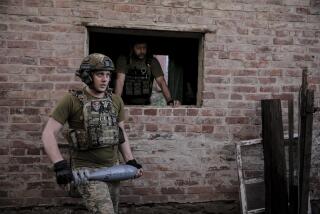U.S. Intelligence Aides Told Lawmakers That Yeltsin Planned to Act : Briefings: Closed-door sessions effectively ensured that there would be little surprise or controversy in Washington.
- Share via
WASHINGTON — U.S. intelligence officials began quietly informing Congress that Russian President Boris N. Yeltsin would invoke extraordinary powers two weeks before he actually said he would do so, according to congressional sources.
In a series of closed-door sessions, CIA and other intelligence officials prepared members of the Senate and the House for Yeltsin’s announcement last Saturday, thus effectively ensuring that there would be little surprise or controversy in Washington.
“Our people knew what he was going to do,” one congressional source said. “They’ve been briefing us to death. The agency made a major effort to have (itself) covered.”
As usual, the intelligence officials did not explain to Congress the sources or the techniques through which they reached their conclusions about Yeltsin’s plans.
The congressional briefings indicate that the CIA, whose record of forecasting political or economic developments in the Soviet Union often has been criticized, has been accurate in its predictions during the current crisis.
“I think their observations are better,” said Sen. John Kerry (D-Mass.), who last month complained bitterly to CIA Director R. James Woolsey at his confirmation hearings that the U.S. intelligence community’s analysis of the Soviet threat had been “totally faulty.”
“I have not been misled in the past few weeks,” said Rep. Dan Glickman (D-Kan.), the new chairman of the House Intelligence Committee.
At the same time, the CIA’s early congressional briefings raise the question of whether the advance warning might have given the Clinton Administration time to give the Russian president approval or even encouragement for his decision to rule by decree. Last weekend, White House Communications Director George Stephanopoulos said there was no “consultation” between the Administration and Yeltsin before his announcement.
Despite his declaration Saturday, Yeltsin delayed publishing his decree until Wednesday. And when he did, he had decided to retreat from declaring emergency rule.
During the congressional briefings, U.S. intelligence officials have expressed confidence that the power struggle between Yeltsin and Russia’s Parliament does not pose any threat to the existing system for control over Russia’s nuclear arsenal.
“They feel that the command and control (over Russia’s nuclear weapons) is very strong,” one congressional source reported. “They continue to monitor those things very closely.”
The current crisis in Moscow comes at a time when the CIA is under intense new pressure on Capitol Hill to reduce its budget and redirect some of the resources and personnel that were used to gather intelligence on the Soviet Union during the Cold War.
Senior U.S. intelligence officials repeatedly have insisted that they already are making all the cutbacks and shifts of personnel that are justified.
“Our budget . . . reflects our changed priorities,” then-CIA Director Robert M. Gates said last November. For example, he said, in the current fiscal year, only about a third of the intelligence community’s resources--and less than 15% of the CIA’s--will be devoted to the former Soviet Union.
Other U.S. intelligence agencies monitoring Russia and the other former Soviet republics include the Defense Intelligence Agency, the National Security Agency and the National Reconnaissance Office.
Both CIA and congressional sources said none of the changes in American intelligence operations have harmed the agency’s ability to monitor events in Russia.
“I don’t think the intelligence community has overshifted (resources away from the former Soviet Union) yet, because it moves very slowly,” Glickman said. “On day-to-day operations, there hasn’t been much change.”
CIA spokesman David Christian said questions about how much budget and resources should be directed toward Russia and the former Soviet republics “are subjects that Mr. Woolsey is dealing with the Administration on.” Meanwhile, Christian said, “day by day, we are doing the analysis that needs to be done.”
However, former Director Gates warned Wednesday that budget cutbacks for this year “put the intelligence community at the edge of its ability to sustain existing collection mechanisms” for the former Soviet Union and for other international flash points such as Bosnia-Herzegovina, Somalia, North Korea and Iraq.
In the current Russian power struggle, some hard-line nationalist forces opposing Yeltsin have sought to portray the president and the reformers supporting him as too close to Western governments. And they have occasionally charged that Western governments or intelligence agencies are secretly supporting Yeltsin.
Russian Internal Security Minister Viktor P. Barannikov complained recently that, despite the end of the Cold War, Western intelligence agencies have been stepping up espionage activities against Russia.
The Russian news agency Itar-Tass reported Wednesday that four Russian servicemen had recently been convicted of treason and sentenced to a high-security prison as punishment for selling secret military information about Russian troop strengths and arms to Western intelligence agents.
The report gave no date for these events, raising the possibility that the timing of their publication this week was linked to the political battles between Yeltsin and his opponents.
Despite the complaints by nationalist forces about Western interference in Russian politics, Gates said in an interview that “even over time, our ability to influence events there is marginal.”
“It’s a very difficult situation,” said Gates, a specialist on Soviet affairs. “Forcing a major conflict (between Yeltsin and his opponents) is a bad outcome. But paralysis (of government in Russia) is a bad outcome also.”
More to Read
Sign up for Essential California
The most important California stories and recommendations in your inbox every morning.
You may occasionally receive promotional content from the Los Angeles Times.













